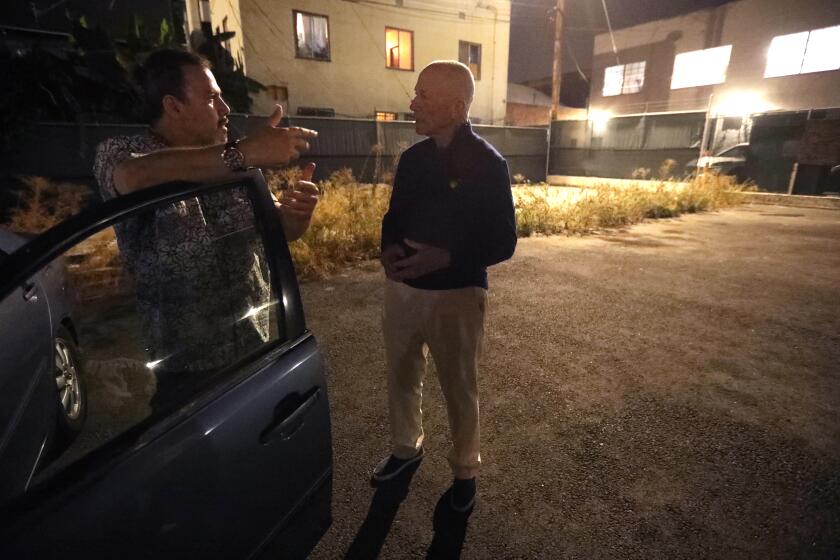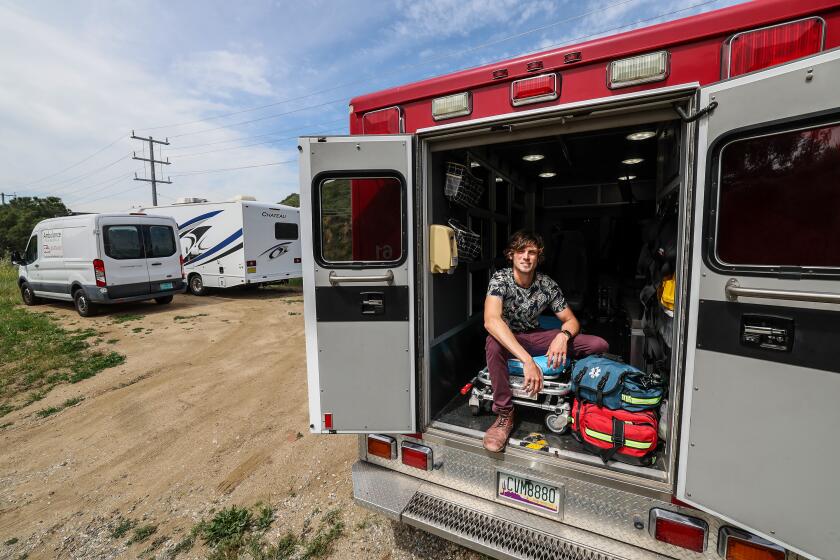Back From Streets, He Helps Organize Homeless : Advocacy: Bob DeLaurier helped to found a group that tries to call attention to the plight of those still out in the cold.
Homeless advocate Bob DeLaurier hit bottom at 3 o’clock one wintry morning three years ago when he hallucinated a field of tall, green grass swaying in a warm breeze.
The scene, painted by cheap wine, was inviting, he said, and he decided to dive in. He awoke in a fountain filled with raw sewage on The Promenade in Long Beach. No public toilets are available in the area, and homeless people use the fountain for a restroom, he said.
“I yelled to my buddies, ‘Hey, shoot me,’ ” DeLaurier, 27, said recently from his Long Beach apartment.
“I couldn’t believe what I’d done. My buddy helped me out of my wet clothes. I had no dry clothes, so I slept in my underwear. When I woke up the next morning, I found that someone had wrapped a warm blue blanket around me. I never found out who did it.”
After that experience, DeLaurier said, he tried to sober up. He fell in love with a woman who shares his passion for poetry, and his life turned around.
He moved into her apartment, found work and they married. They now have an 18-month-old son and another child due in May. DeLaurier has a white-collar job, and they have just moved into a larger apartment.
But DeLaurier remembers living on the street, and he wants to help those who are still there. Last fall, with homeless advocate Marshall Blesofsky, he set up the Homeless Organizing Committee, a group of about 100 homeless people and their supporters who try to call attention to the plight of the homeless in Long Beach.
DeLaurier’s road to life on the streets began in Fort Lauderdale, Fla., where his father, a disabled Detroit auto worker, moved the family of eight in search of a better life. After graduating from high school and working at a dead-end job, DeLaurier, a frustrated writer of short stories and poetry, began drinking at night.
“I was working manual labor, putting in long days. I’d drink a six-pack at night watching television and pass out,” he said. “It was not a happy life.”
He hit the road and ended up on the streets of Long Beach. To pay for food and alcohol, he sold his blood to a plasma clinic on Anaheim Street.
“I couldn’t believe I was on the street. There’s a lot of denial” in being homeless, he said. “I was drinking almost continually. It was the only way to escape the reality I was in. There was no way to stay sober and deal with the homeless thing.”
He said he would sneak into church bathrooms to shave and wash his hair, drying it with a paper towel. “To me it was trauma to go more than four or five days without a shower. It was disgusting to be dirty,” he said.
He sometimes showered fully clothed at the Long Beach Marina so his body and clothes would both get clean. The water was about 50 degrees.
DeLaurier refers to his months on the street, his brief stays in Long Beach shelters and his three weeks on welfare as “social hell.”
“I felt like I was being treated like a dog, or worse,” he said. “It seemed like it was intentional. (Welfare workers) treat you so bad that you walk out. I wasn’t ready to lose all my self-esteem.”
It was after reaching his lowest point that he had a chance encounter with Leah Weed, a 29-year-old writer, at the Belmont Pier in Long Beach. Soon they were reading each other’s poems. Ten weeks later, they married.
“She had been living in the Middle East for eight years, studying archeology and living on a kibbutz in Israel, and had none of the usual prejudice toward the homeless that many Americans have,” DeLaurier said.
DeLaurier landed a temporary job with a tractor company. Two promotions later, he is a parts analyst, with a salary and health insurance, and is able to provide for his growing family.
His supervisor at Kubota Tractor in Compton, Curtis Gregory, describes DeLaurier as an excellent employee.
“A lot of people close their eyes to the homeless, so people don’t admit they’re homeless (when they apply for a job). But he came out and admitted he was. We had faith that he could do the job, and we’ve promoted him several times,” Gregory said.
Now that DeLaurier is back on his feet, he is dedicated to helping others. With the Homeless Organizing Committee, he speaks out at City Council meetings and participates in demonstrations. The group holds weekly meetings for the homeless to let them know what services are available. Recently they helped about 25 homeless people register to vote in Long Beach’s 2nd District.
“We speak with the homeless, not for them. We continually try to solicit their opinions. We’re offering political say to the homeless,” he said.
The group’s members were scattered when the Long Beach City Council recently banned sleeping outdoors on public property and several homeless encampments were herded out of the city. Some of them went to Fragment House, a shelter in Compton that was then closed in late March because it lacked an operating permit.
Recent rains also have slowed the group’s momentum.
“It’s very difficult to organize the homeless,” DeLaurier said recently. “The very nature of homelessness precludes organizing: You’re at the mercy of the weather and the food sources.”
A main concern of the committee is the need for a long-discussed multi-service center for the homeless, which could simplify the search for jobs and permanent housing. The proposed center would house social workers, a health-care screening service, a job placement center, shower facilities and storage for personal belongings.
Another organization that serves the homeless, Christian Outreach Appeal, has obtained a site for such a center.
Sheila Pagnani, homeless services coordinator for the city, said the center also would have a room designated for the organizing committee, where homeless people could hold meetings and leave messages.
“I feel it’s important for homeless people to take part in their own rehabilitation. There’s not much point in middle-class white people sitting around making decisions for homeless people” without consulting them, she said.
She describes DeLaurier as “a terrific role model for homeless people.”
“He was on the street and knows what it’s like,” she said.



